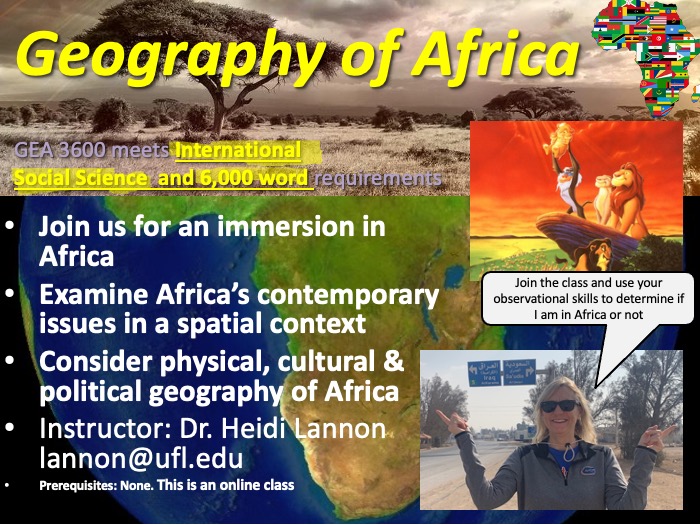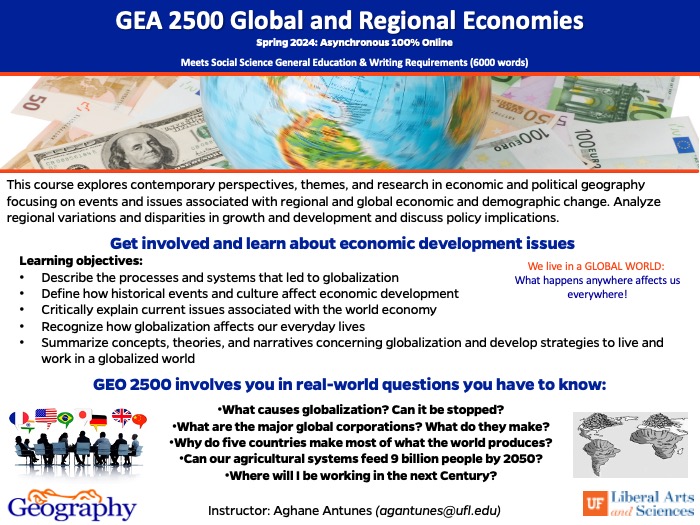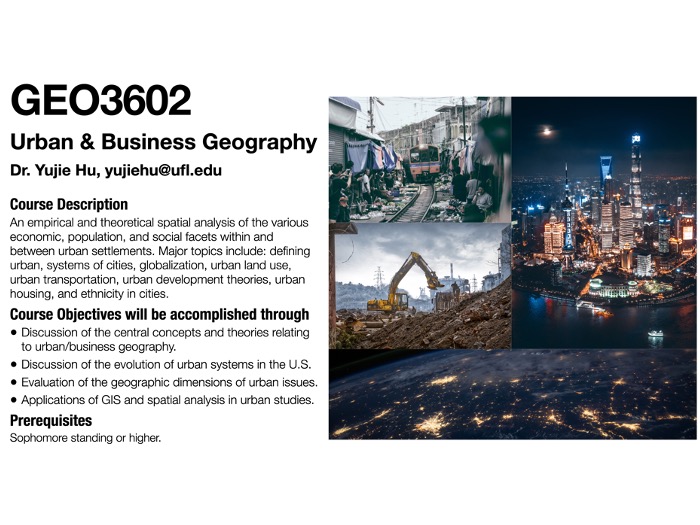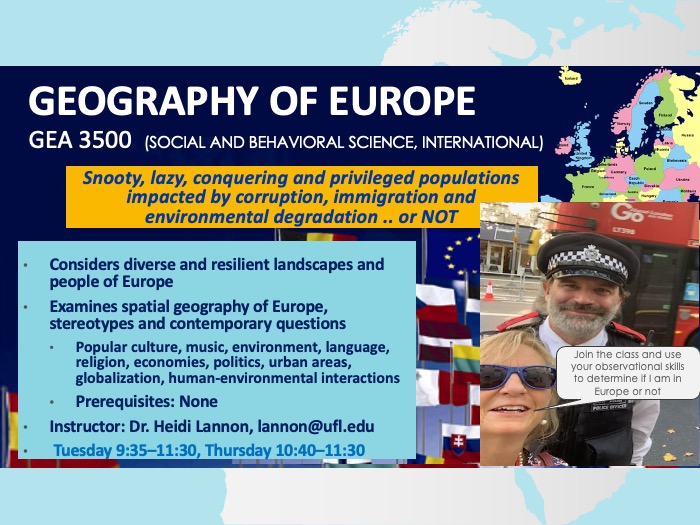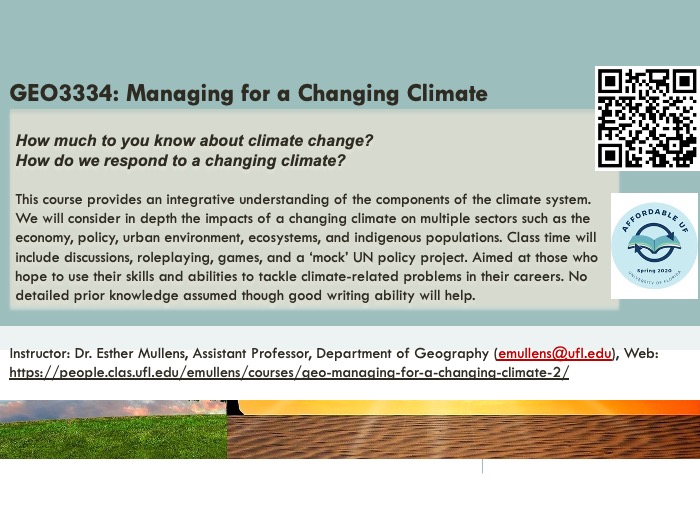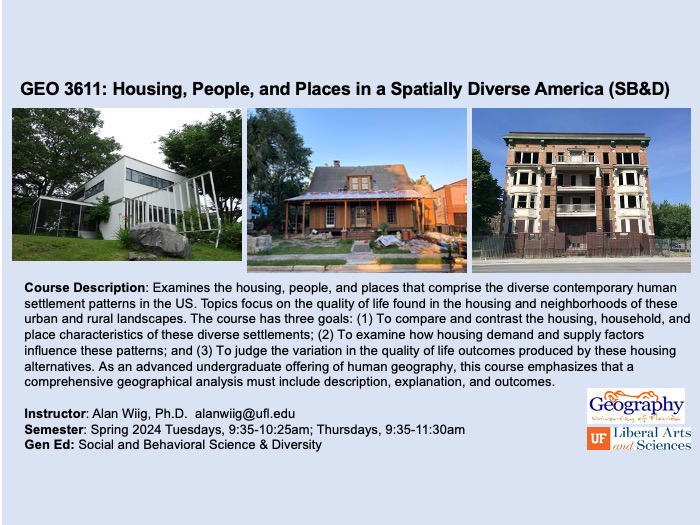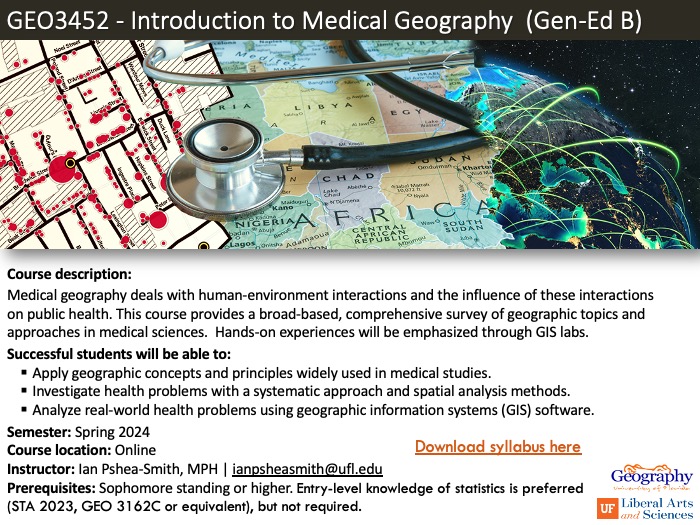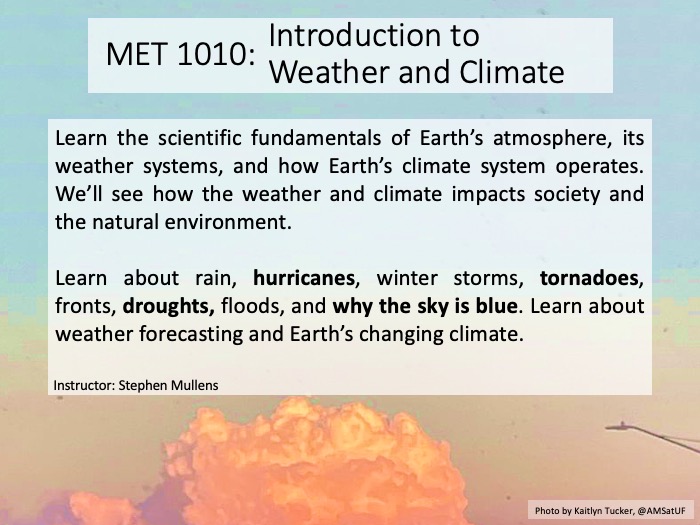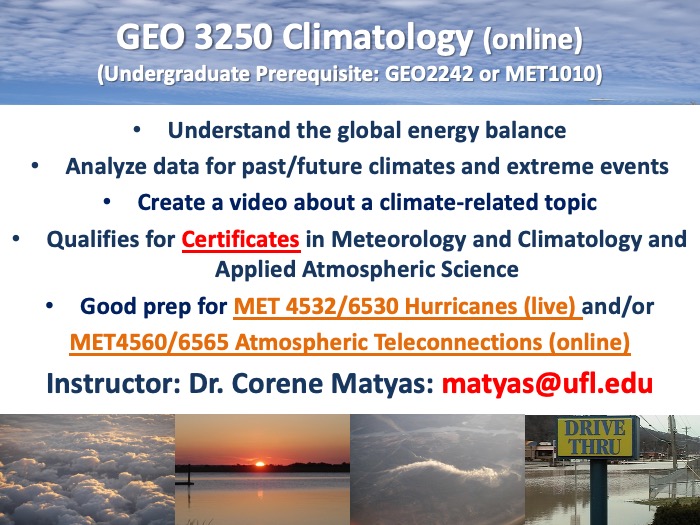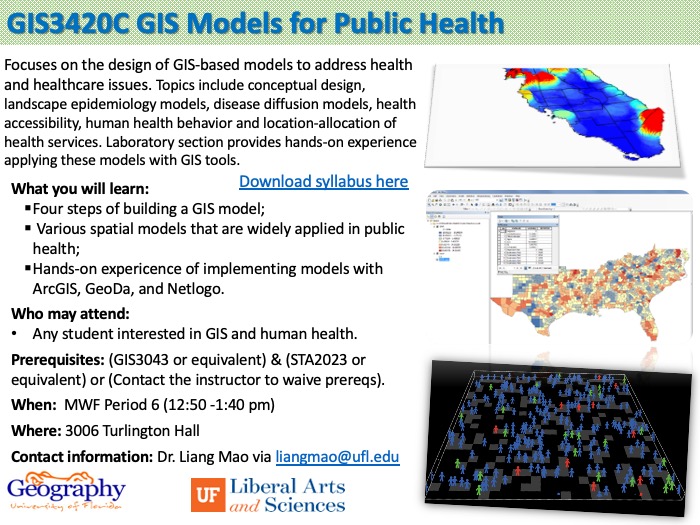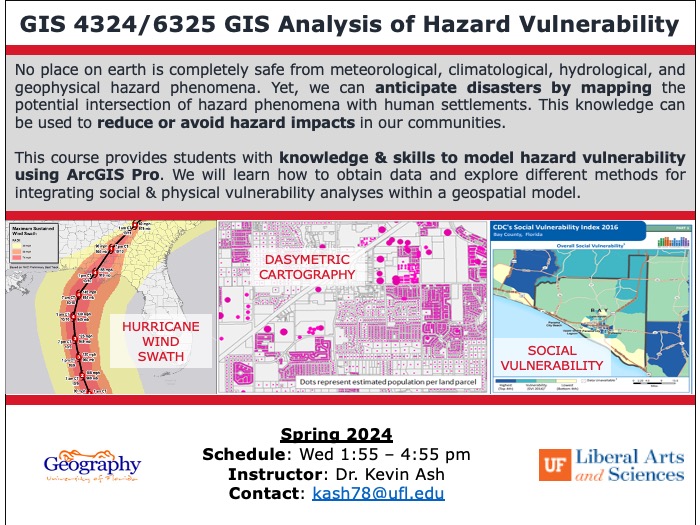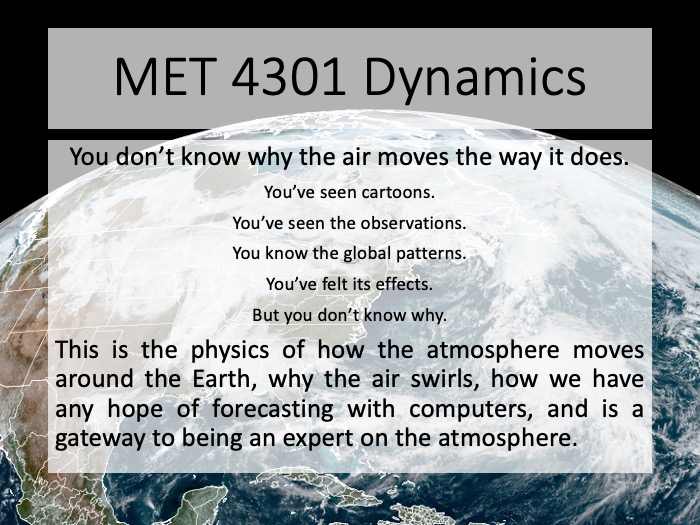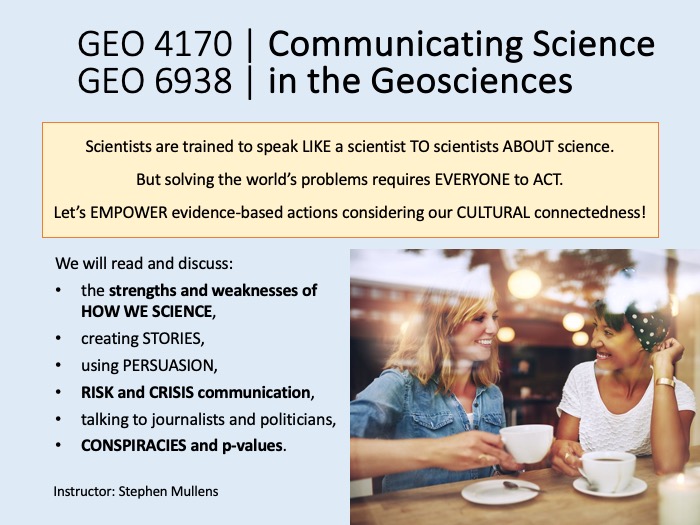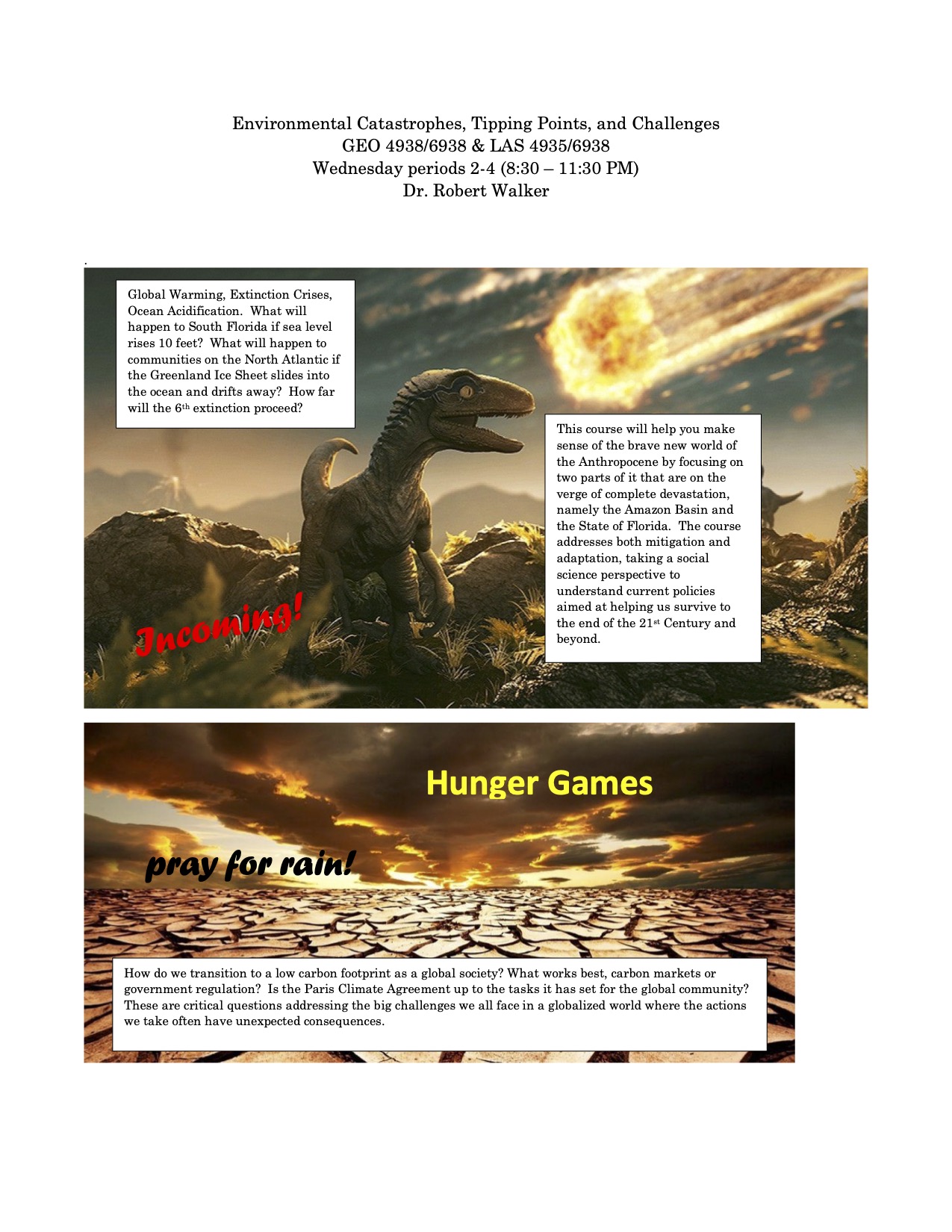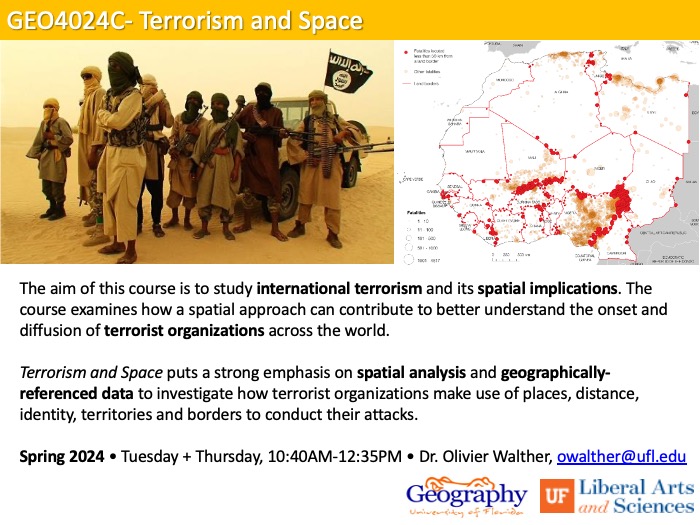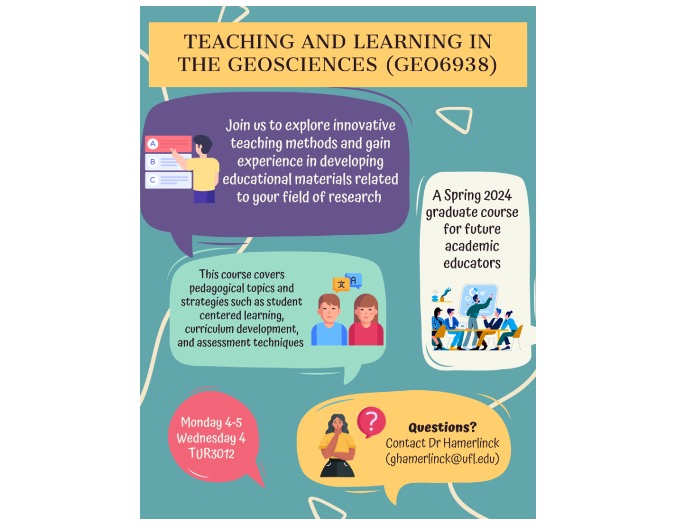
This webpage lists the courses that will be offered by UF Geography Department faculty in the Spring 2024 semester. Click on the images to reveal the text on each slide. Each course also provides a links to find further details.
Jump to a section:
Quest General Education
AI & GIS Meteorology Earth Hazards Human Geog Economic Geog Medical Geog Political GeogGraduate Pedagogy
Click on images to reveal the text on each slide.
Quest Courses from UF Geography
Quest 1
Blues Music & Culture – Dr. Tim Fik
Quest 2
The Next Pandemic – Dr. Gaby Hamerlinck
Living With Rising Seas – Dr. Katy Serafin
The Future of Energy – Dr. Johanna Engström
General Education Courses
WR & N & S – 6000 Words Writing Requirement, International, Social and Behavioral Science
GEA3600 – Geography of Africa – Dr. Heidi Lannon – ONLINE
Join us for an immersion in Africa
Examine Africa’s contemporary issues in a spatial context
Consider physical, cultural & political geography of Africa
WR & S – 6000 Words Writing Requirement, Social and Behavioral Science
GEO2500 – Global and Regional Economies – Aghane Antunes
This course explores contemporary perspectives, themes, and research in economic and political geography focusing on events and issues associated with regional and global economic and demographic change. Analyze regional variations and disparities in growth and development and discuss policy implications.
Learning objectives: Describe the processes and systems that led to globalization, Define how historical events and culture affect economic development, Critically explain current issues associated with the world economy, Recognize how globalization affects our everyday lives, and Summarize concepts, theories, and narratives concerning globalization and develop strategies to live and work in a globalized world.
GEO 2500 involves you in real-world questions you have to know. What causes globalization? Can it be stopped? What are the major global corporations? What do they make? Why do five countries make most of what the world produces? Can our agricultural systems feed 9 billion people by 2050? Where will I be working in the next Century?
GEO3602 – Urban and Business Geography – Dr. Yujie Hu
An empirical and theoretical spatial analysis of the various economic, population, and social facets within and between urban settlements. Major topics include: defining urban, systems of cities, globalization, urban land use, urban transportation, urban development theories, urban housing, and ethnicity in cities.
Course objectives will be accomplished through discussion of the central concepts and theories relating to urban/business geography, discussion of the evolution of urban systems in the U.S., evaluation of the geographic dimensions of urban issues, and applications of GIS and spatial analysis in urban studies.
GEO3502 – Economic Geography – CLASSROOM OR ONLINE
WR – 2000 Words Writing Requirement
GEA3405 – Geography of Latin America – Dr. Cynthia Simmons – ONLINE
N & S – International, Social and Behavioral Science
GEA3500 – Geography of Europe – Dr. Heidi Lannon
“Snooty, lazy, conquering and privileged populations impacted by corruption, immigration and environmental degradation .. or NOT”
Considers diverse and resilient landscapes and people of Europe. Examines spatial geography of Europe, stereotypes and contemporary questions. Popular culture, music, environment, language, religion, economies, politics, urban areas, globalization, human-environmental interactions.
GEA1000 – Geography for a Changing World – Md. Shaharier Alam – ONLINE
GEO2006 – Natural Hazards Geography – Dr. Kevin Ash – ONLINE
GEO2420 – People, Place, and Culture – Donal Bissainte
N & P – International, Physical Science
GEO3334 – Managing for a Changing Climate – Dr. Esther Mullens
How much to you know about climate change?
How do we respond to a changing climate?
This course provides an integrative understanding of the components of the climate system. We will consider in depth the impacts of a changing climate on multiple sectors such as the economy, policy, urban environment, ecosystems, and indigenous populations. Class time will include discussions, roleplaying, games, and a ‘mock’ UN policy project. Aimed at those who hope to use their skills and abilities to tackle climate-related problems in their careers. No detailed prior knowledge assumed though good writing ability will help.
Course website
D & S – Diversity, Social and Behavioral Science
GEO3611 – Housing, People, and Places in a Spatially Diverse America – Dr. Alan Wiig
Examines the housing, people, and places that comprise the diverse contemporary human settlement patterns in the US. Topics focus on the quality of life found in the housing and neighborhoods of these urban and rural landscapes. The course has three goals: (1) To compare and contrast the housing, household, and place characteristics of these diverse settlements; (2) To examine how housing demand and supply factors influence these patterns; and (3) To judge the variation in the quality of life outcomes produced by these housing alternatives. As an advanced undergraduate offering of human geography, this course emphasizes that a comprehensive geographical analysis must include description, explanation, and outcomes.
GEO2410 – Social Geography – Dr. Jamaal Wright – ONLINE
B – Biological Sciences
GEO3452 – Introduction to Medical Geography – Minh Tan Luong – ONLINE
Medical geography deals with human-environment interactions and the influence of these interactions on public health. This course provides a broad-based, comprehensive survey of geographic topics and approaches in medical sciences. Hands-on experiences will be emphasized through GIS labs.
Successful students will be able to apply geographic concepts and principles widely used in medical studies, investigate health problems with a systematic approach and spatial analysis methods, and analyze real-world health problems using geographic information systems (GIS) software.
GEO3315 – Hungry Planet: Global Geographies of Food – Lacey Harris-Coble
P – Physical Science
MET1010 – Introduction to Weather and Climate – Stephen Mullens
Learn the scientific fundamentals of Earth’s atmosphere, its weather systems, and how Earth’s climate system operates. We’ll see how the weather and climate impacts society and the natural environment.
Learn about rain, hurricanes, winter storms, tornadoes, fronts, droughts, floods, and why the sky is blue. Learn about weather forecasting and Earth’s changing climate.
GEO3250 – Climatology – Dr. Cori Matyas – ONLINE
Understand the global energy balance
Analyze data for past/future climates and extreme events
Create a video about a climate-related topic
Qualifies for Certificates in Meteorology and Climatology and Applied Atmospheric Science
Good prep for MET 4532/6530 Hurricanes (live) and/or MET4560/6565 Atmospheric Teleconnections (online)
GEO2200 – Dynamic Planet Earth – Dr. Johanna Engström – CLASSROOM OR ONLINE
GEO3162C – Introduction to Quantitative Analysis for Geographers – Yue Jing – ONLINE
S – Social and Behavioral Science
GEO3430 – Population Geography – Debjani Das
Artificial Intelligence and GIS Analysis
GIS3420C – GIS Models for Public Health – Dr. Liang Mao
Focuses on the design of GIS-based models to address health and healthcare issues. Topics include conceptual design, landscape epidemiology models, disease diffusion models, health accessibility, human health behavior and location-allocation of health services. Laboratory section provides hands-on experience applying these models with GIS tools.
What you will learn:
Four steps of building a GIS model;
Various spatial models that are widely applied in public health;
Hands-on expericence of implementing models with ArcGIS, GeoDa, and Netlogo.
GIS4324 – GIS Analysis of Hazard Vulnerability – Dr. Kevin Ash
No place on earth is completely safe from meteorological, climatological, hydrological, and geophysical hazard phenomena. Yet, we can anticipate disasters by mapping the potential intersection of hazard phenomena with human settlements. This knowledge can be used to reduce or avoid hazard impacts in our communities.
This course provides students with knowledge & skills to model hazard vulnerability using ArcGIS Pro. We will learn how to obtain data and explore different methods for integrating social & physical vulnerability analyses within a geospatial model.
GIS2002 – The Digital Earth – Mohammad Safaei – ONLINE
GIS2114 – The World & Big Data – Natalia Dambe – ONLINE
GIS3001C – Geovisualization and Map Design – Md. Shamsudduha Sami – CLASSROOM OR ONLINE
GIS3043 – Foundations of Geographic Information Systems – Dr. Anwar Sounny-Slitine – CLASSROOM OR ONLINE
GEO3162C – Introduction to Quantitative Analysis for Geographers – Yue Jing – ONLINE
GIS4102C – GIS Programming – Dr. Anwar Sounny-Slitine – CLASSROOM OR ONLINE
GIS4121 – Geospatial Analysis – Hartwig Hochmair – ONLINE
GIS4123C – GeoAI – Geographic Artificial Intelligence – Dr. David Keellings
Meteorology and Climatology
MET1010 – Introduction to Weather and Climate – Stephen Mullens
Learn the scientific fundamentals of Earth’s atmosphere, its weather systems, and how Earth’s climate system operates. We’ll see how the weather and climate impacts society and the natural environment.
Learn about rain, hurricanes, winter storms, tornadoes, fronts, droughts, floods, and why the sky is blue. Learn about weather forecasting and Earth’s changing climate.
GEO3334 – Managing for a Changing Climate – Dr. Esther Mullens
How much to you know about climate change?
How do we respond to a changing climate?
This course provides an integrative understanding of the components of the climate system. We will consider in depth the impacts of a changing climate on multiple sectors such as the economy, policy, urban environment, ecosystems, and indigenous populations. Class time will include discussions, roleplaying, games, and a ‘mock’ UN policy project. Aimed at those who hope to use their skills and abilities to tackle climate-related problems in their careers. No detailed prior knowledge assumed though good writing ability will help.
Course website
MET4301 – Atmospheric Dynamics – Stephen Mullens
You don’t know why the air moves the way it does. You’ve seen diagrams. You’ve seen the observations. You know the global patterns. You’ve felt its effects. But you don’t know why.
This is the physics of how the atmosphere moves around the Earth, why the air swirls, how we have any hope of forecasting with computers, and is a gateway to being an expert on the atmosphere. Let’s go.
Physical Geography
GEO4170 – Communicating Science in the Geosciences – Stephen Mullens
Scientists are trained to speak LIKE a scientist TO scientists ABOUT science. But solving the world’s problems requires EVERYONE to ACT. Let’s EMPOWER evidence-based actions considering our CULTURAL connectedness!
We will read and discuss:
the strengths and weaknesses of HOW WE SCIENCE,
creating STORIES,
using PERSUASION,
RISK and CRISIS communication,
talking to journalists and politicians,
CONSPIRACIES and p-values.
GEO2006 – Natural Hazards Geography – Dr. Kevin Ash – ONLINE
GEO2200 – Dynamic Planet Earth – Dr. Johanna Engström – CLASSROOM OR ONLINE
GEO2351 – Geographical Sciences and Sustainability – Jawata Saba
GEO3372 – Conservation of Resources – Arusha Chaudhary
Human Geography
GEO3611 – Housing, People, and Places in a Spatially Diverse America – Dr. Alan Wiig
Examines the housing, people, and places that comprise the diverse contemporary human settlement patterns in the US. Topics focus on the quality of life found in the housing and neighborhoods of these urban and rural landscapes. The course has three goals: (1) To compare and contrast the housing, household, and place characteristics of these diverse settlements; (2) To examine how housing demand and supply factors influence these patterns; and (3) To judge the variation in the quality of life outcomes produced by these housing alternatives. As an advanced undergraduate offering of human geography, this course emphasizes that a comprehensive geographical analysis must include description, explanation, and outcomes.
GEO4938 – Environmental Catastrophes, Tipping Points, and Challenges – Dr. Bob Walker
Global Warming, Extinction Crises, Ocean Acidification. What will happen to South Florida if sea level rises 10 feet? What will happen to communities on the North Atlantic it the Greenland Ice Sheet slides into the ocean and drifts away? How far will the bth extinction proceed?
This course will help vou make sense of the brave new world of the Anthropocene by focusing on two parts of it that are on the verge of complete devastation, namely the Amazon Basin and the State of Florida. The course addresses both mitigation and adaptation, taking a social science perspective to understand current policies aimed at helping us survive to the end of the 21st Century and bevond.
GEO2410 – Social Geography – Dr. Jamaal Wright – ONLINE
GEO2420 – People, Place, and Culture – Donal Bissainte
GEO3315 – Hungry Planet: Global Geographies of Food – Lacey Harris-Coble
GEO3427 – Plants, Health and Spirituality – Tierney Shimansky
Economic Geography
GEO2500 – Global and Regional Economies – Aghane Antunes
This course explores contemporary perspectives, themes, and research in economic and political geography focusing on events and issues associated with regional and global economic and demographic change. Analyze regional variations and disparities in growth and development and discuss policy implications.
Learning objectives:Describe the processes and systems that led to globalization, Define how historical events and culture affect economic development, Critically explain current issues associated with the world economy, Recognize how globalization affects our everyday lives, and Summarize concepts, theories, and narratives concerning globalization and develop strategies to live and work in a globalized world.
GEO 2500 involves you in real-world questions you have to know. What causes globalization? Can it be stopped? What are the major global corporations? What do they make? Why do five countries make most of what the world produces? Can our agricultural systems feed 9 billion people by 2050? Where will I be working in the next Century?
GEO3602 – Urban and Business Geography – Dr. Yujie Hu
An empirical and theoretical spatial analysis of the various economic, population, and social facets within and between urban settlements. Major topics include: defining urban, systems of cities, globalization, urban land use, urban transportation, urban development theories, urban housing, and ethnicity in cities.
Course objectives will be accomplished through discussion of the central concepts and theories relating to urban/business geography, discussion of the evolution of urban systems in the U.S., evaluation of the geographic dimensions of urban issues, and applications of GIS and spatial analysis in urban studies.
GEO3502 – Economic Geography – CLASSROOM OR ONLINE
Medical Geography
GEO3452 – Introduction to Medical Geography – Minh Tan Luong – ONLINE
Medical geography deals with human-environment interactions and the influence of these interactions on public health. This course provides a broad-based, comprehensive survey of geographic topics and approaches in medical sciences. Hands-on experiences will be emphasized through GIS labs.
Successful students will be able to apply geographic concepts and principles widely used in medical studies, investigate health problems with a systematic approach and spatial analysis methods, and analyze real-world health problems using geographic information systems (GIS) software.
GEO3454 – Peoples and Plagues – Dr. Sadie Ryan
Political Geography
GEO4024C – Terrorism and Space – Dr. Olivier Walther
The aim of this course is to study international terrorism and its spatial implications. The course examines how a spatial approach can contribute to better understand the onset and diffusion of terrorist organizations across the world.
Terrorism and Space puts a strong emphasis on spatial analysis and geographically-referenced data to investigate how terrorist organizations make use of places, distance, identity, territories and borders to conduct their attacks.
GEO3430 – Population Geography – Debjani Das – ONLINE
Graduate Pedagogy
GEO6938 – Teaching and Learning in the Geosciences – Dr. Gaby Hamerlinck
A Spring 2024 graduate course for future academic educators.
Join us to explore innovative teaching methods and gain experience to developing educational materials related to your field of research.
This course covers pedagogical topics and strategies such as student centered learning, curriculum development, and assessment techniques.
